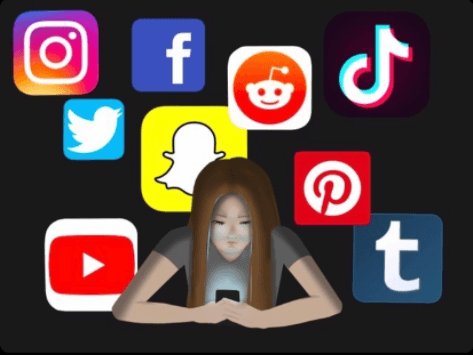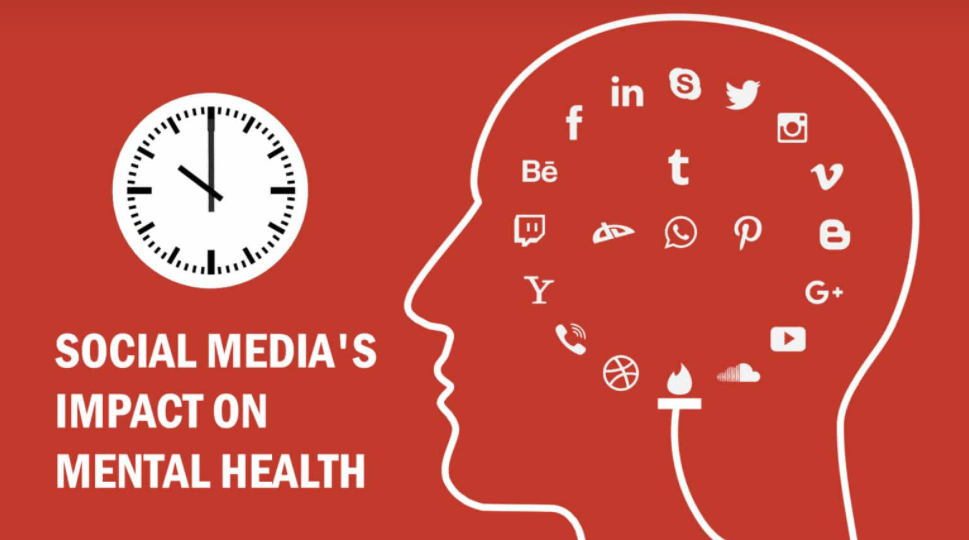The social media platform Instagram made headlines last year to suppress likes, suppress comparisons, and hurt feelings associated with linking popularity to share content. But do these efforts fight mental health issues, or are they just band-aiding the injury?
This is a small step in the right direction for psychologist Jacqueline Sperling, Ph.D., at McLean Hospital, which works with young people suffering from anxiety disorders about the recent ban on Instagram. “Even if you remove the likes, there are still opportunities for comparison and feedback. People can compare themselves to others and people can still post comments.”
Table of Contents
How Social Media Affects Mental Health?
Improper or misuse or say overuse of Social media platforms can have some serious affects on your mental health some of which are:
Incompetences about your life or appearance
Even if you know that the images you see on social media have been tampered with, they can make you insecure about how you look or what you are in your life. This is happening. Similarly, we all know that other people only share highlights of their lives, rarely the low points that everyone experiences. But when you scroll through a friend’s airbrushed photos from their tropical beach vacation or read about their exciting new promotion at work it doesn’t lessen feelings of jealousy and resentment.
Fear of missing out (FOMO)
Although Fomo has been around longer than social media, sites like Facebook and Instagram give the impression that other people are having more fun or a better life than you. The thought that you are missing out on certain things can affect your self-esteem, trigger anxiety, and promote excessive use of social media. FOMO can force you to dig into your phone every few minutes to check for updates, or it must respond to every warning – meaning you are taking a risk while driving at night. Getting enough sleep or prioritizing social media interactions. On real-world relations.
Loneliness
A University of Pennsylvania study found that increased use of Facebook, Snapchat, and Instagram reduced feelings of loneliness. In contrast, the study found that reducing social media use can help you feel better and more isolated and improve your overall well-being.
Depression and anxiety
Humans need face-to-face contact to stay mentally healthy. Nothing can reduce stress and increase your mood faster or more effectively than eye-to-eye with those who care about you. The more you prioritize social media interactions over personal relationships, the greater the risk of developing or exacerbating mental disorders such as anxiety and depression.
Cyberbullying
About 10 percent of teens report being harassed on social media and by many other users. Social media platforms like Twitter are hotspots for spreading malicious rumors, lies and abuse, leaving permanent emotional scars.

Self-absorption
Sharing endless selfies and all your inner thoughts on social media creates unhealthy self-centeredness and distance you from real-life relationships.
Signs that Social Media is affecting your mental health
Everyone is different and no specific time is allocated on social media, or how often you check for updates, or the number of posts you make that your usage is becoming unhealthy. . Instead, it affects your mood and other aspects of your life as well as your motivations to use it from the impact of time spent on social media.
For example, your use of social media can be a problem if you neglect face-to-face relationships, distract yourself from work or school, or feel jealous, angry, or sad. Similarly, if you are tempted to use social media because you are bored or lonely, or want to post something that would make others jealous or dissatisfied, it is time to reconsider your social media habits.
Social media Indicators that can adversely affect your mental health:
Spending more time on social media than real-world friends
Using social media has become an option for many of your offline social interactions. Even when you are out with friends, you feel the need to constantly check social media, which often fuels the feeling that others are having more fun than you.
Comparing yourself negatively with others on social media
You have low self-esteem or a negative body image. You may also have irregular eating habits.
Cyberbullying experience Or you worry that you have no control over what people post about you.
Distraction at school or work: You may feel pressured to post regular content about yourself, receive comments or likes on your posts, or respond quickly and enthusiastically to friends’ posts.
No time for introspection: Every empty moment is filled by engaging with social media, which gives you little or no time to reflect on the important things – who you are, what you think, or the way you deal with it. Allows you to grow as a person.
Taking risky behavior: To get likes, shares, or positive feedback on social media. You may engage in dangerous pranks, post obscene content, cyberbullying others, or use your phone while driving or in other unsafe situations.
Struggling with a sleep problem: Do you check social media last night, even when you first wake up in the morning or at night? Light coming from phones and other devices can disrupt your sleep, which can have a serious impact on your mental health.
Symptoms of anxiety or depression may worsen: Instead of helping to reduce negative emotions and boost your mood, you may feel more anxious, sad, or lonely after using social media.

Tips to improve mental health if stuck with social Media
Step 1: Reduce online time
According to a 2018 study from the University of Pennsylvania, reducing social media use to 30 minutes a day can significantly reduce anxiety, depression, loneliness, sleep problems, and FOMO levels. But you don’t have to reduce your social media usage to improve your mental health. The same study found that having more awareness about your social media usage can have beneficial results on your mood and vision.
While 30 minutes a day is not an actual goal for most of us, we can still benefit by reducing the time we spend on social media. For many of us, this means reducing how much we use our smartphones. The following tips may help:
- Use the app to track how much time you spend on social media every day. Then set a goal for how much you want to reduce it.
- Turn off your phone at certain times of the day while you are driving, meeting, gym, having dinner, spending time offline with friends, or playing with your kids. Do not take your phone with you to the bathroom.
- Do not lie down with your phone or tablet. Turn off the devices and leave them in another room overnight to charge.
- Disable social media notifications. It is difficult to prevent your phone’s continuous ringing, beeping, and dinging, alerting you of new messages. Turning off notifications can help you regain control of your timing and focus.
- Border inspection. If you must check your phone every few minutes, limit yourself by limiting your checks to once every 15 minutes. Then once every 30 minutes, then once an hour. There are apps that automatically limit what you can access to your phone.
- Try removing social media apps from your phone so you can only check Facebook, Twitter and the like from your tablet or computer. If this seems like a very serious step, try deleting one social media app at a time to see how much you really miss.
For more tips on reducing your overall phone usage, read Smartphone Addiction.
Step 2: Change your focus
Many of us access social media without being completely addicted or thinking about useless moments. But by focusing on your motivation to log in, you can not only reduce the time you spend on social media but also improve your experience and avoid many negative aspects.
If you use social media to get specific information, check out a sick friend or share new photos of your child with family, for example, if you are just logged in, your experience will be very different. You’re bored, want to see how many likes you got from previous posts, or see if you’ve missed anything.
The next time you go to use social media, pause for a moment and explain your motivation to do so.
Do you use social media as an alternative to real life?
Are there any healthy alternatives to your social media usage? For example, if you are alone, invite a friend over for coffee instead. Feeling? Take a walk or go to the gym. Bored? Take on a new passion. Social media can be quick and convenient, but there are often healthier, more effective ways to satisfy a desire.
Are you an active or passive user of social media?

Following someone else’s conversations on social media or scrolling incognito through posts does not provide any meaningful connection. It also increases feelings of loneliness. However, being actively involved will give you more engagement with others.
Does social media make you feel inadequate or frustrated about your life?
You can fight FOMO symptoms by focusing on what you have rather than what you do not have. Make a list of all the positive things in your life and re-read it when you feel like you have lost something better. And remember: no one’s life is as perfect as it appears on social media. We all deal with heartache, self-doubt, and depression, even if we choose not to share online.
Step 3: Spend more time with friends offline
We all need the face-to-face organization of others to stay happy and healthy. Best of all, social media is a great tool to facilitate real-life connections. If you allow virtual connections to replace real-life friendships in your life, there are many ways to make meaningful connections without relying on social media.
Set aside time each week to chat offline with friends and family. Try to hold a regular meeting where you always turn off your phones.
If you ignore face-to-face friendships, contact an old friend (or an online friend) and arrange to meet. If you both live busy lives, offer to execute tasks or exercise together.
Join the Activity: Enjoy a hobby, creative endeavor, or fitness activity and join a group of people you meet regularly.
Don’t let social inequalities get in the way. Even if you are shy, there are proven ways to get rid of insecurities and increase friendships. Learn about Instagram Tips.
If you do not think you have someone to spend time with, contact acquaintances. Many other people feel uncomfortable about making new friends like yourself – so be an ice breaker. Invite a coworker to dinner or ask a neighbor or classmate to join you for coffee.
Chat with strangers: Watch from your screen and join the people you pass by at public transit, coffee shop, or grocery store. How you feel by laughing or saying hello – and you never know where it will lead but be careful best practice is to connect with the people in Your locality or neighborhood. Learn about Facebook lookalike audience.
Step 4: Say thank you
Feeling and expressing gratitude about important things in your life can sometimes bring welcome relief to the anger, hostility, and resentment created by social media.
Allocate time for reflection: Try to keep a Thanksgiving magazine or use the Thanksgiving app. Keep track of all the great memories and positive things in your life – as well as the things and people you would miss if they weren’t all of a sudden in your life. If you are more likely to post awkwardly or negatively, you can also express your gratitude on social media — but you can benefit more from the personal reflection that is not subject to the scrutiny of others.
Practice mindfulness: Experiencing FOMO and comparing yourself to others will keep you away from the frustrations and disappointments in life. Instead of being completely engrossed in the present, focus on “whats ifs” and “if only” that will save you from comparing the lives you see on social media. By practicing mindfulness, you can learn to live more in the present moment, reduce the effects of FOMO and improve your overall mental health.
Volunteer: Just as human beings work hard for social relationships, we work hard to give to others. Helping other people or animals not only improves your community and gets you an important cause, but also makes you feel happier and more grateful.
Tips related to Social Media For Parents Dealing with their Child

There are developmental challenges and social pressures in childhood and adolescence. For some children, social media has a way of exacerbating those problems and promoting anxiety, bullying, depression, and self-esteem issues.
If you are worried about your child’s social media usage, it may be tempting to confiscate their phone or another device. But it can cause more problems by isolating your children from their friends and from the positive aspects of social media. Instead, there are other ways to help your child use Facebook, Instagram, and other platforms more responsibly.
Monitor and limit your child’s social media use:
The more you know about how your child is interacting on social media, the better you can solve any problems. Parental control apps can help limit your child’s data usage or limit their phone use to certain times of the day. You can also adjust the privacy settings on various platforms to limit threats or potential exposure to predators.
Talk to your child about the underlying issues:
Problems in social media usage can often hide deeper issues. Does your child have a problem fitting in school? Do they suffer from shame or social anxiety? Are home problems stressing them out? Learn about Social media Why, What and How
Apply the “social media” break:
For example, you can ban social media until your child finishes their homework in the evening, allow phones at the dinner table or in their bedroom, and plan family activities. It prevents the use of phones or other devices. To avoid sleep problems, always insist on turning off the phone at least an hour before bedtime. Learn more about Social media from here.
Teach your children that social media is not an accurate reflection of people’s lives. They should not compare themselves or their lives negatively with others on social media. People only post what others want to see. Images are manipulated or carefully posed and selected. And having fewer friends on social media will make your child less popular or less deserving.
Encourage exercise and offline interests:
Remove your child from social media by encouraging them to engage in physical activities and hobbies that include real-world interactions. Exercise is great for reducing anxiety and stress, boosting self-esteem, and improving mood — and this is what you can do as a family. Depending on how engaged your child is, their mood and sense of self-worth will decrease, depending on how many friends, likes, or shares they have on social media.
Hope! You find this content interesting and helpful. Don’t forget to share, subscribe and leave comments. Thank you.






9 Comments
Aasha
Really educatint and important content
inamdurrani60
Thank You Aasha
cruise
Well that is some really good and detailed information on social media marketing affects
inamdurrani60
Thanks a lot Cruise
Frank
Really good topic is touched. Good lucrative
inamdurrani60
Thanks Frank
zoritoler imol
Hello! I just would like to give a huge thumbs up for the great info you have here on this post. I will be coming back to your blog for more soon.
Reiko Papay
I’m amazed, I have to admit. Rarely do I come across a blog that’s both equally educative and engaging, and without a doubt, you have hit the nail on the head. The issue is an issue that not enough men and women are speaking intelligently about. I am very happy that I stumbled across this during my hunt for something relating to this.